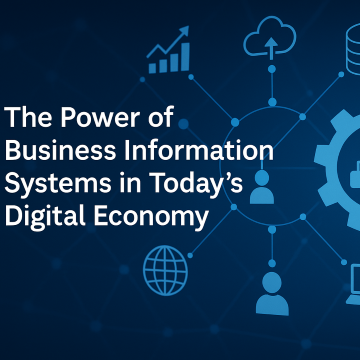Introduction
In an age where digital
transformation is reshaping the global economy, Business Information Systems
(BIS) have emerged as essential tools for organisations aiming to improve
efficiency, productivity, and decision-making. At ANDILE MTETWA INNOVATIONS
PBC, we believe that strategic implementation of BIS is key to unlocking
innovation and achieving competitive advantage in Zimbabwe and across Africa.
What Are Business
Information Systems?
Business Information Systems are structured arrangements of people, technology, and processes designed to collect, process, store, and distribute information to support business operations and management. These systems bridge the gap between IT and business by aligning technological solutions with organisational goals.
Whether it’s a small
enterprise or a multinational corporation, BIS play a vital role in ensuring
data-driven decisions, operational efficiency, and seamless customer
experiences.
Key Components of
Business Information Systems
1.
Hardware &
Infrastructure
Devices and physical systems such as servers, computers, and networking tools
form the backbone of BIS.
2.
Software
Applications
These include ERP systems, CRM platforms, and AI-powered analytics tools
tailored to business processes.
3.
Databases
Central repositories that store structured data, enabling fast access,
reporting, and insights.
4.
People
Users, analysts, developers, and decision-makers who interact with and derive
value from BIS.
5.
Processes
Business workflows and protocols that the systems are designed to streamline
and optimise.
Benefits of Business
Information Systems
·
Enhanced
Decision-Making
Through real-time data analytics and reporting tools, BIS empower leaders to
make informed and strategic decisions.
·
Improved
Efficiency & Productivity
Automation of routine tasks reduces manual errors and allows employees to focus
on high-value activities.
·
Data-Driven
Strategy
Businesses can predict market trends, understand customer behaviour, and tailor
services accordingly.
·
Scalability
& Agility
Cloud-based BIS solutions can grow with your business, supporting expansion
without heavy infrastructure investment.
·
Competitive
Advantage
By leveraging AI, big data, and intelligent systems, organisations can stay
ahead in rapidly changing markets.
Real-World Applications
of BIS at ANDILE MTETWA INNOVATIONS PBC
At ANDILE MTETWA
INNOVATIONS PBC, we design, develop, and implement BIS solutions tailored
to African businesses:
·
Custom
Enterprise Software to automate
processes and manage resources.
·
AI-Powered
Analytics Platforms that help
businesses uncover patterns and opportunities.
·
Cloud-Based
ERP Solutions for small to medium
enterprises looking to scale sustainably.
·
E-commerce
Management Systems for platforms like
TARAYAKO.
·
Real Estate
Information Systems used in Open
Property Zone, streamlining listings and transactions.
Business Information
Systems in the African Context
In Africa, where digital
infrastructure is still emerging, BIS can be a game-changer. By integrating
modern technologies into traditional business models, companies can:
·
Reach
underserved markets
·
Improve
financial inclusion
·
Create
employment through digital platforms
·
Bridge the
digital divide across rural and urban areas
Our platforms such as AIELI
DIGITAL and AIELIDEMY are examples of BIS in action — enhancing
access to freelance work and digital education, respectively.
Final Thoughts
As technology continues to
evolve, Business Information Systems are no longer a luxury but a necessity for
growth and sustainability. By embracing BIS, African businesses can unlock
their full potential, drive innovation, and compete globally.
At ANDILE MTETWA INNOVATIONS PBC, we are committed to developing smart, scalable, and secure BIS solutions that address today’s challenges and anticipate tomorrow’s needs.

 May 17, 2025 - BY Admin
May 17, 2025 - BY Admin